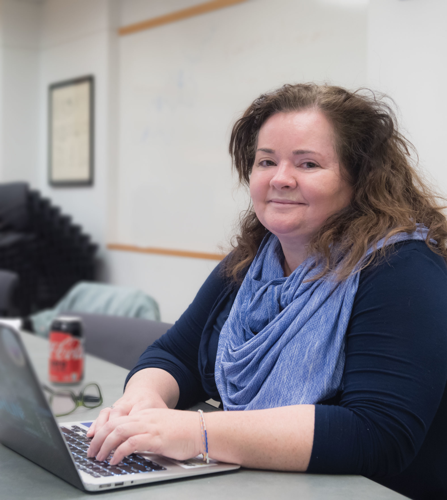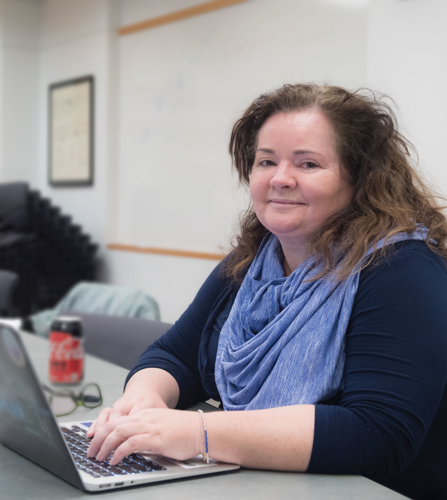
BethAnn McLaughlin
Neuroscientist BethAnn McLaughlin is an extremely busy woman. It’s early on a Friday afternoon, and McLaughlin, an assistant professor of neurology and pharmacology at Vanderbilt University Medical Center, says she’s already been up for 12 hours. The day before, she delivered a speech at the University of California-Irvine on fighting sexual harassment in the scientific community. She then took a red-eye flight back to Nashville so she could make a lab meeting with her graduate and undergraduate students. As soon as she landed, she did a phone interview with a national publication before grabbing a quick lunch with her child.
McLaughlin’s lab team focuses on how the brain responds to stress — and in the lab meeting that she had hurried to Nashville to attend, she and her students discuss investigating disorders like microcephaly. McLaughlin seems tired, but she lights up when students start answering her questions.
“These are my people,” she says, smiling.
But McLaughlin’s work, and any work her students are doing in her lab, could be cut short. She was recently denied tenure at Vanderbilt after 17 years, and a grant she submitted to fund her work has just run out. McLaughlin, 51, says her tenure denial stems from her testifying in the campus investigation of another professor and medical researcher, Aurelio Galli. A student alleged that Galli sexually harassed and intimidated her, causing her to drop out of her program. (The student also took Galli to court in 2014, before the campus investigation, and settled before the case went to trial.) Galli has since left the university.
In late 2014, McLaughlin submitted her application for tenure. Vanderbilt’s Appointments and Promotions Committee recommended her to move forward in the process.
“And then in 2015, everything ground to a halt because the dean of faculty became aware that I was participating in a Title IX investigation [as a witness in the harassment case],” McLaughlin says. “The person who that case was against started aggressively retaliating against me and claimed all of these things about me to get back at me.”
McLaughlin says the university then temporarily stalled the tenure process and launched a Title IX investigation into her, citing statements made online under a multi-user Twitter account. Title IX investigations, based on federal law against discrimination on campus, are often used to deal with claims of workplace abuse, sexual harassment or racism at universities. The main tweet in question, McLaughlin says, was one sent from that account about a colleague that said: “I may stab her.” McLaughlin tells the Scene she does not recall sending that tweet.
“The faculty disciplinary process was awful and just held everything up for about 18 months,” McLaughlin says, adding that she eventually made it through that process with no disciplinary action taken against her.
After the investigation concluded in 2017, the Executive Committee of the Executive Faculty of the Vanderbilt School of Medicine approved McLaughlin’s tenure. That is, McLaughlin says, until the dean of the School of Medicine, Jeffrey Balser, intervened.
“He started sending out all this information from the investigation to the committee,” McLaughlin says. “And asked them to reconsider.”
The committee then reversed its decision, voting to deny McLaughlin tenure in February.
McLaughlin has been heavily engaged in the #MeTooSTEM movement, which seeks to hold abusers in the science community accountable. She runs the website metoostem.com. For that work, McLaughlin received a $250,000 Disobedience Award from the Massachusetts Institute of Technology’s Media Lab in 2018.
Around the same time in 2018, Galli filed suit against McLaughlin for defamation. Galli says he believes he has nothing to do with with McLaughlin not getting tenure — he reached out to the Scene via email after seeing a tweet McLaughlin sent to a Scene reporter. That lawsuit is still ongoing.
“This issue should be between Dr. McLaughlin and Vanderbilt University,” Galli wrote. “The fact that my name keeps resurfacing over the internet connected with Dr. McLaughlin’s tenure process is unconscionable, hurtful and unjust. I left Vanderbilt in 2017.”
VUMC’s chief communications officer, John Howser, declined to comment on the specifics of McLaughlin’s case. “The School of Medicine’s tenure process is overseen by Vanderbilt University and is confidential,” Howser wrote in an email to the Scene. “All parties are firmly committed to this imperative, so we are unable to answer specific questions or offer comments about an individual’s tenure status.”
Howser also provided a statement posted to the university’s website after an article about McLaughlin came out in the prestigious journal Science. Howser’s post says recent reports about the university are a “grossly inaccurate picture of the culture and values of Vanderbilt University.”
“We share genuine concern about the real and pervasive challenges facing women in science around the world and are working to address them here at Vanderbilt,” the post reads. “We do not tolerate sexual discrimination and misconduct, or retaliation against those that stand up against it, and we work to foster an environment that encourages reporting and protects those who do so. Our community holds diversity, equity and inclusion as bedrock values and any suggestion otherwise is false.”
McLaughlin is appealing the tenure decision to Vanderbilt Chancellor Nicholas S. Zeppos, and some of her undergraduate students have delivered a petition to Zeppos’ office asking that McLaughlin receive tenure. Students who delivered the petition said they did not get to meet with Zeppos, but were received by several administrative personnel who said they would make sure he got it. At this point, Zeppos is the only person who has the power to overturn the denial.
“I’ve done the right thing for four years, and waited and waited,” McLaughlin says. “There are real issues around sexual harassment in the scientific community, and maybe it’s viewed as disobedient that I’m fighting against them. But that doesn’t mean I’m going to stop anytime soon.”






